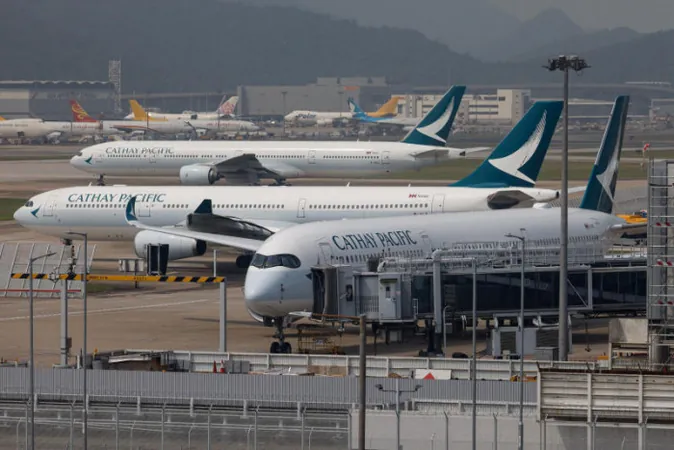
Cathay Pacific Stands Firm on Power Bank Policy Amid Growing Restrictions from Rivals
2025-03-14
Author: Yan
Cathay Pacific's Decision
In a bold move distinguishing itself from other airlines in the region, Hong Kong's Cathay Pacific Airways has decided to maintain its policy on the use of power banks during flights. This decision comes on the heels of Singapore Airlines' recent announcement to restrict passengers from charging devices using portable battery chargers on board, a policy that has echoed across various Asian carriers.
Airline's Stance
A spokesman for Cathay Pacific confirmed, 'We have assessed all the risks associated with the use of power banks and will make no changes to our existing policy.' The airline permits passengers to carry and use spare lithium batteries, including portable chargers, with a capacity of up to 160 watt-hours (Wh) in the cabin. However, Cathay explicitly prohibits passengers from charging these devices using in-seat outlets or USB ports throughout the flight. Travelers are, nonetheless, allowed to use their power banks to recharge electronic devices while in the air.
Trend Among Airlines
This cautious approach comes after Singapore Airlines' decision, effective from April 1, to deny customers the ability to charge portable power banks via onboard USB ports and bar the charging of personal devices with these batteries. This policy is part of a broader trend among airlines in response to safety incidents involving lithium batteries. In January, a portable power bank was implicated in a fire onboard an Air Busan aircraft, leading to widespread evacuations and heightened fears about battery safety.
Singapore Airlines' Compliance
Singapore Airlines highlighted their compliance with the International Air Transport Association’s (IATA) Dangerous Goods Regulations regarding lithium batteries, stating that power banks can still be taken as carry-on items but are prohibited in checked luggage. Specifically, passengers can bring power banks with a capacity of up to 100Wh without prior approval, while those between 100Wh and 160Wh require airline permission.
Other Airlines Following Suit
Other airlines like Thai Airways and AirAsia have also announced similar restrictions, which will begin shortly. In Taiwan, Eva Air and its colleagues are following suit, reflecting a growing caution in air travel safety protocols regarding lithium-ion batteries.
Growing Caution on Safety
The renewed scrutiny on power banks stems from a serious incident earlier this year when a Hong Kong-bound Air Busan flight experienced a fire attributed to a passenger's power bank stored in the overhead bin. This incident resulted in significant damage to the aircraft and prompted South Korean authorities to enforce stricter regulations on the carriage of such devices.
Inconsistent Policies
As airlines navigate the potential dangers of lithium batteries, the inconsistency in policies can lead travelers to wonder about the logistics of carrying and using power banks in-flight. As we sail further into 2023, airline safety guidelines remain a crucial component for passenger safety, with Cathay Pacific’s steadfast policy serving as a notable exception in a rapidly changing industry.
Conclusion
Stay tuned for updates as other airlines may follow suit with regulations of their own!



 Brasil (PT)
Brasil (PT)
 Canada (EN)
Canada (EN)
 Chile (ES)
Chile (ES)
 Česko (CS)
Česko (CS)
 대한민국 (KO)
대한민국 (KO)
 España (ES)
España (ES)
 France (FR)
France (FR)
 Hong Kong (EN)
Hong Kong (EN)
 Italia (IT)
Italia (IT)
 日本 (JA)
日本 (JA)
 Magyarország (HU)
Magyarország (HU)
 Norge (NO)
Norge (NO)
 Polska (PL)
Polska (PL)
 Schweiz (DE)
Schweiz (DE)
 Singapore (EN)
Singapore (EN)
 Sverige (SV)
Sverige (SV)
 Suomi (FI)
Suomi (FI)
 Türkiye (TR)
Türkiye (TR)
 الإمارات العربية المتحدة (AR)
الإمارات العربية المتحدة (AR)